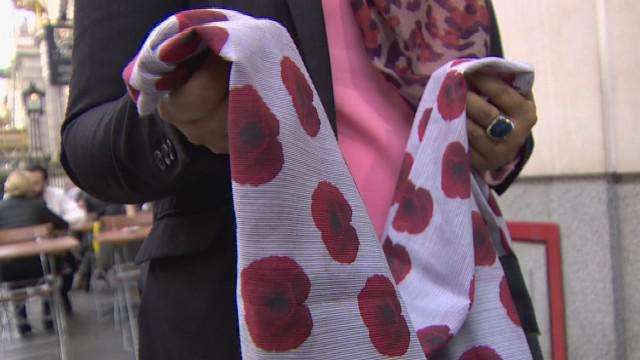(单词翻译:单击)
London (CNN) -- November is the season for poppies in Britain:Red paper flowers to remember those fallen in war.
伦敦(CNN)--十一月的英国是罂粟花的季节:鲜红的纸花缅怀的是战争的亡魂。
The tradition dates back to World War I; the paper blooms -- reminiscent of those that grew over the battlefields of Flanders -- are sold by thousands of volunteers, at train stations, in shops, and in offices.
这个传统起源于第一次世界大战;这种纸花使人追忆起在佛兰德斯的战场上盛开的花朵。在火车站、商场、办公楼,成千的志愿者都在卖纸花。

Pinned to the lapels of everyone from the man and woman in the street to news anchors and celebrities, the poppies raise money for the Royal British Legion, a charity which supports serving and former soldiers and their families.
从男士到女士,从街头行人到新闻主持人和社会名流,所有人衣领上都别着这种罂粟花。卖花所得的资金都会捐给英国皇家退伍军人协会,用来帮助那些现役和退伍军人和他们的家人。
Enter the Poppy Hijab: a Muslim head scarf with the iconic poppy print, launched by the Islamic Society of Britain, and sold online by British Future, with the money going to the Poppy Appeal.
罂粟花头巾的诞生:大不列颠伊斯兰协会发布的穆斯林头巾,带有罂粟花印花图案,通过英国未来在网上销售,而销售所得还是交给罂粟花募捐。
The hijab was launched to commemorate Khudadad Khan, the first Muslim to receive the Victoria Cross 100 years ago.
这种头巾是用来纪念Khudadad Khan——一百年前第一个获得维多利亚十字勋章的穆斯林。
"Of the 1.2 million soldiers, Indian soldiers that fought in World War I, 400,000 were Muslim," Sughar Ahmed President of the Islamic Society of Britain told CNN. "That really hits home to me. Because that's part of my heritage. That's part of who I am."
“在第一次世界大战中一百二十万印度士兵参战,其中有四十万是穆斯林,”大不列颠伊斯兰协会主席Sughar Ahmed告诉CNN。“这深深地影响着我。因为那是我血统的一部分,也是我自己的一部分。”
But wearing a poppy is a sensitive issue for many British Muslims. In 2010, an extremist Muslim group set the paper flowers on fire in protest at British troops in Afghanistan and Iraq. Their act angered Britons and polarized opinion among many British Muslims.
但是对很多英国穆斯林来说,带罂粟花头巾是一个敏感的话题。2010年,一个极端穆斯林团体点燃了纸折罂粟,抗议英国军队进军阿富汗和伊拉克。这个行为让英国人震怒,也造成很多英国穆斯林意见不一。
Online, the scarf has received a mixed reception, with some taking to Twitter to mock it as a test of British loyalty.
在网络上,这种头巾引起不同的声音,有人在Twitter上调侃说,这个头巾是用来评判对英国的忠诚度。
I'm outraged at the fact that the ISB want me to wear a#poppyhijab. My hijaab is symbolic of my religious conviction not a billboard!
伊斯兰协会让人带罂粟花头巾的行为让人愤怒。我的头巾是我宗教信仰的标志,不是一个广告牌!
British Muslims 'urged' to wear#poppyhijab. Translation: wear it to prove you're properly British.
英国穆斯林佩戴罂粟花头巾的潜台词就是为了证明他(她)确实是个英国人。
Sughar Ahmed acknowledges the criticism, but reiterates that it's a choice to buy and wear the scarf, not a test.
Sughar Ahmed 感谢了这些评论,但再次强调佩戴这个头巾只是一个选择,不是忠诚度检测。
"One thing that I think is really intrinsic to this whole debate about the poppy is that we do have a choice," she says. "That, for me, is really quite significant -- because that's what people fought for. For our freedoms. So that we could have a democracy. We could have a choice.”
“我想所有关于这朵罂粟花的争论中有一个最本质的东西,那就是我们完全自由选择,”她说。“这对我来说意义重大,因为这就是人所争取的,为了我们的自由。这样我们就能拥有民主,拥有选择。”
In the streets near the East London Mosque, reviews of the poppy hijab were more positive.
在东伦敦清真寺附近的街道上,对罂粟花头巾的看法则积极得多。
Asked if she would consider wearing the poppy hijab, one woman in a headscarf with green flowers told CNN: "Well, I usually wear the poppy. The red one. But a headscarf? Yeah, as long as it goes with my outfit, why not?"
当问到她是否考虑会带罂粟花头巾时,这名带着绿色花朵头巾的女士是这样回答的:“我一般会带罂粟花,红色的那种。至于罂粟花头巾嘛?只要能和我的衣服搭配,就没有问题。”


